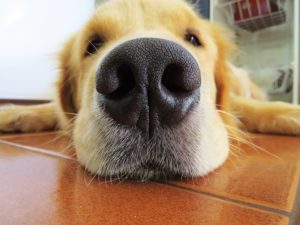
What’s that smell? If you’ve got a candle or incense burning or a plug-in permeating the air, you’re not alone. It’s estimated 75% of U.S. households use a product to scent their homes. A waft of lavender can be soothing, but candles and dogs are not a great combination. In fact, scented household items are potentially detrimental to your dog’s health.
Don’t throw out your plug-ins and incense yet. First, learn about the danger and then figure out if you need to make changes in your home.

What’s the danger for candles and dogs?
Before we dig into the things you need to know about candles, chemicals, other air fresheners, think about this: an open flame and a dog who doesn’t understand the consequences of inadvertently knocking into it.
Never leave a candle unattended when you have a dog in the house. The flame is a potential fire hazard around dogs, especially if it’s within reach of your pup. Make sure they’re not easily accessible on coffee or side tables. Place the candles high off the ground so your dog doesn’t accidentally knock one over. Most people are aware of this, but it’s a good reminder.
Scents and your dog
Not all candles and air fresheners are created equally. Many are made with synthetic chemicals that produce indoor pollutants that affect animals.
Holistic veterinarian Dr. Marcie Fallek told Animal Wellness Magazine, “Animals are more sensitive in general to poisons, partly due to their size and also to their metabolism. Conventional candles contain many toxins that may pose a risk to your [dog]. These dangerous chemicals are likely or known carcinogens, neurotoxin, and reproductive toxins. We and our animals inhale these toxins into our lungs, and from there they go directly into the bloodstream.”
Think about your dog’s lifestyle: he probably spends most of his time indoors among the air pollutants. He probably is often near or on the floor where the pollutants fall after floating through the air and when he grooms himself, he may consume particles of the toxins that are on his fur or in the environment. The fewer toxins you can bring into your home, the better for your pooch.

Harmful chemicals to know
Dogs and synthetic candles don’t mix well. Animal Wellness Magazine created a list of the chemicals to avoid the next time you purchase something to scent your home:
- Paraffin: Most candles are made from this a wax that is petroleum waste. It releases carcinogens when burned.
- Lead: Some wicks have a metal core, which can contain lead. When you burn the candle it’s possible the lead released into the air will be above the EPA threshold. Lead harms the central nervous system.
- Benzene: This known carcinogen is emitted from the soot of some candles.
- Acrolein, acetaldehyde, and formaldehyde: These dangerous chemicals are carcinogens and can reduce air quality. They are linked to irritation in the throat and airways, nosebleeds, and respiratory ailments.
- Toluene: This is found in candle soot. It can affect the central nervous system.
Now take a look at the air fresheners in your aerosol sprays and plug-ins. Dr. Karen Shaw Becker recommends you be on the lookout for these harmful ingredients:
- Volatile organic compounds, or VOCs, like acetone, ethanol, pinene, and acetate. When these substances react with the ozone in the air, they generate a range of secondary pollutants like formaldehyde and ultrafine particles. Ultrafine particles have links to heart and lung disease and respiratory problems.
- Naphthalene. This chemical is shown to cause inflammation, tissue damage, and cancer in the lungs of rodents.
- 1,4-Dichlorobenzene (1,4-DCB) has links to compromised lung function and liver cancer in mice.
Do you want your dog inhaling those chemicals while they’re inside?
Getting rid of the stench
You understand that artificial scents can be harmful to your pup, but you want your home to smell great. Fair. There are ways to achieve this goal without introducing toxic chemicals to your dog.
Open your windows. This is a simple way to circulate fresh air in your home without the chemical consequences.
Buy an air purifier. Maybe it’s the middle of winter and you don’t want to let the cold in or you live in a place with high air pollution. Air purifiers are an alternative. They clear odors, allergens, dust, and mold.
Switch to 100% beeswax candles. If you love candles for ambiance or to help you relax, try these. They are non-toxic, good for allergies, and naturally dripless. They’re friendly for the whole family.
Diffuse essential oils. Be careful which oils you buy, because some are toxic to pets. But, like candles, there are safe bets like therapeutic grade essential oils. Pick the right ones, and these diluted and diffused essential oils can be a better choice for freshening a space.
Things don’t have to smell badly
Life, in general, can be stinky. Dogs bring another layer of interesting scents into your home. Make sure you read the ingredients before you use air fresheners to clear out funky smells. There are clean options, do your homework first.
The post Candles & Air Fresheners: The Smell of Danger for Your Dog appeared first on iHeartDogs.com.
via Whisker Therapy

